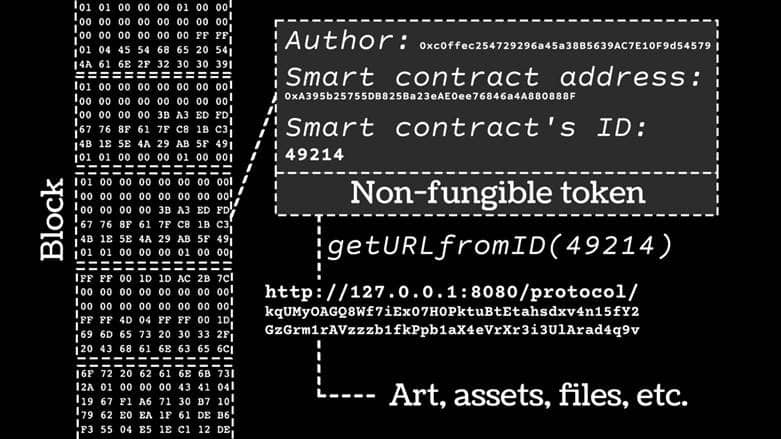As we’ve explained before, a Non-Fungible Token (NFT) isn’t a form of intellectual property (IP). Instead, it’s more like a receipt for a unique item of IP, to show that you own it – like a pink slip for a car or the deed to a house.
Although NFTs aren’t IP, they’re surrounded by a world of IP rights.
For example, NFT art is created by an artist (or by an AI using template components created by an artist). As we mentioned before, and as the New York Times reported:
The artist Mike Winkelmann, also known as Beeple, has just sold an NFT at a record-breaking $69.3 million, the third-highest price achieved by a living artist. The sale, at Christie’s, for the purely digital work was the strongest indication yet that NFTs, or “nonfungible tokens,” have taken the art market by storm, making the leap from specialist websites to premier auction houses. Beeple, a newcomer to the fine-art world who first heard about NFTs five months ago, is the most high-profile artist to profit off the huge boom in sales of these much-hyped but poorly understood commodities.
If the party selling the NFT isn’t the same as the artist (as in the case of Beeple), then the actual artist needs to either sell or license his or her IP rights to the NFT publisher – just as an author would sell or license rights in a novel to a traditional book publisher.
Things are messy in the IP/NFT world right now because NFT rights weren’t on anyone’s radar when a lot of IP was created, and thus aren’t covered by the contracts drawn up at the time.
As we discussed in this blog, Quentin Tarantino is turning seven scenes from the script for his film Pulp Fiction into “secret” non-fungible tokens. His handwritten script is a tangible artifact, which he owns, but the words it contains are IP. Miramax, which owns the film version of Pulp Fiction, claims that the NFT would infringe its rights.
As Ledger Insights reports,
Yuga Labs, the founding company behind the Bored Ape Yacht Club NFT collection, bought the intellectual property (IP) rights to the CryptoPunks and Meebits non-fungible token (NFT) collections from Larva Labs. Yuga Labs now also owns 423 CryptoPunks and 1711 Meebits. A key aspect of the deal is that CryptoPunk NFT owners will now be able to exploit the IP rights to their characters commercially.
As the article notes,
CryptoPunks was one of the first NFT projects to entice a digital community of loyal followers. In June of 2017, its founders launched 10,000 caricature-like digital figures, one of the first NFT collections ever, that were free on a first-come, first-serve basis. It took a while for the project to kick off, but several individual CryptoPunks have sold for millions of dollars since then. The cheapest ones sell for around $182,000.
(It’s also important to note that the NFT market is exceedingly volatile and subject to fraud. As The Independent reported, sales of NFTs have fallen 92 percent since September.)
NFT publisher Bored Ape Yacht Club (BAYC) early on recognized the value in the intersection between NFTs and IP. As Ledger Insights notes,
Individual owners of Bored Apes partnered with brands to use their NFT almost like a celebrity in the metaverse. Music artist Timbaland launched a music label based on Bored Apes with some of the collectibles as artists. Universal Music started a music group in the metaverse with four Apes as group members. Blockchain gaming company Animoca announced a play-to-earn game with Yuga Labs and Adidas purchased and branded a Bored Ape. The idea is that the IP of each collectible is owned and managed by its owner (which sometimes is Yuga Labs), which increases the scope of opportunities for commercializing and popularizing collections. Through every individual partnership, the collection’s profile, utility, and value increase for every owner.
Just like the haiku above, we like to keep our posts short and sweet. Hopefully, you found this bite-sized information helpful. If you would like more information, please do not hesitate to contact us here.


